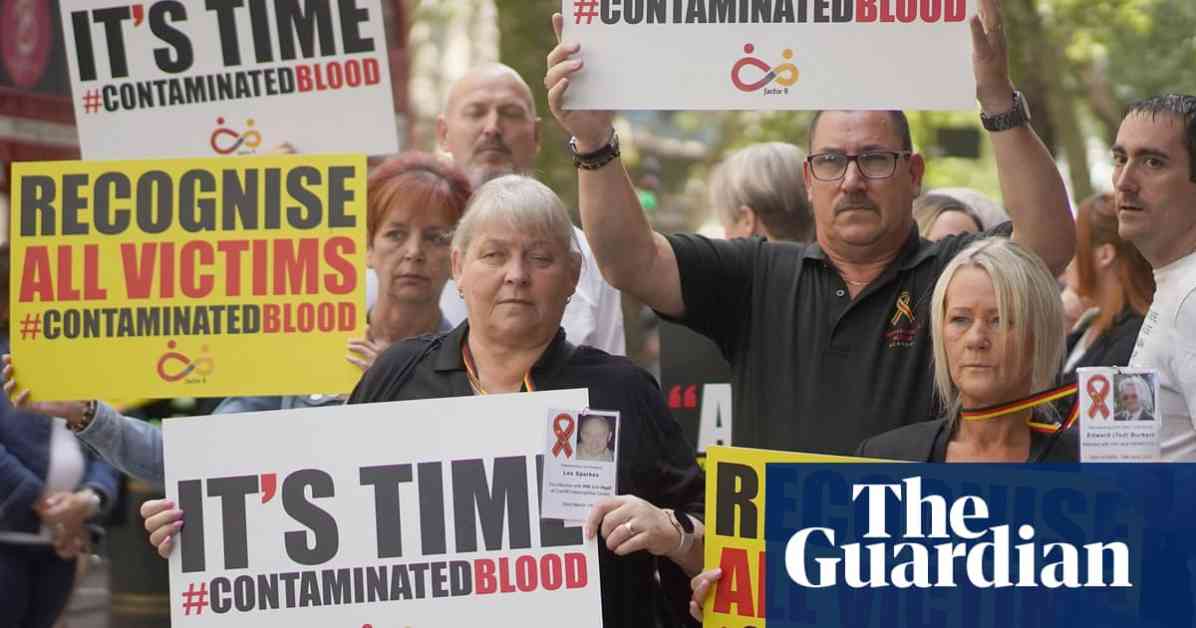Victims of the contaminated blood scandal in the UK are finally set to receive compensation for the devastating impact of diseases such as HIV and hepatitis C, which were caused by infusions of contaminated blood in the 1970s and 1990s. The UK government has announced that some individuals may be entitled to more than £2.5 million in compensation, with payments expected to begin before the end of the year.
Long-Awaited Compensation Scheme
The outline of the compensation scheme was revealed in May following the final report of the infected blood inquiry, which exposed what was described as a “decades-long moral failure at the heart of our national life” by then UK Prime Minister Rishi Sunak. More than 3,000 people lost their lives, while many others had their lives irreparably damaged as a result of the scandal. Campaigners have been advocating for justice and compensation for victims and their families for years, urging the government to take responsibility for the tragedy.
Sir Robert Francis, the chair of the Infected Blood Compensation Authority (IBCA), was commissioned by the government to consult with victims and their families to develop the compensation scheme. Francis recommended over 70 changes to the initial proposals, most of which have been accepted by the government. One significant change includes an additional payment of £10,000 for individuals who were infected due to “unethical research” practices.
Additional Support for Victims
Victims who were unknowingly involved in trials as children at the Lord Mayor Treloar College in Hampshire, one of the most shocking aspects of the scandal revealed by the inquiry, will receive an extra £15,000 in compensation. The government is expected to introduce regulations for the new compensation scheme by August 24, allowing survivors who were infected to start receiving payments by the end of the year. For those who have already passed away, payments will be made to their estates.
A second set of regulations covering victims’ families and other affected individuals will be introduced in the coming months, with payments for these groups scheduled to begin in 2025. Nick Thomas-Symonds, the paymaster general and minister for the Cabinet Office, emphasized the government’s commitment to delivering compensation promptly and ensuring that those affected by the scandal receive the support they need. While compensation cannot fully address the harm caused by the contaminated blood scandal, the government is also focused on implementing broader cultural changes to prevent such tragedies from happening again.
Continued Support and Transparency
Francis also recommended that victims be allowed to continue receiving existing support payments for the rest of their lives, a decision that was welcomed by advocacy groups. Kate Burt, the chief executive of the Haemophilia Society, expressed relief that the support schemes will be ongoing, providing security for those infected and their families. She stressed the importance of the IBCA maintaining communication with the affected community as the compensation scheme is implemented.
Total compensation payments will be determined based on various factors, including loss of earnings and care needs resulting from the scandal. The government has outlined illustrative scenarios to demonstrate the potential compensation amounts, with individuals infected with HIV due to contaminated blood possibly eligible for up to £2,615,000 in compensation.
Government sources have not disclosed an estimate of the overall cost of the compensation payments, but approximately 3,000 people have already registered with the IBCA as potential recipients. The infected blood inquiry, chaired by Sir Brian Longstaff, spent six years gathering evidence of the systemic failures that led to the scandal. Sunak issued an official apology to the victims and their families upon the publication of the inquiry’s report.
Rachel Halford, the chief executive of the Hepatitis C Trust, welcomed the government’s decision to continue support payments for life, addressing a major source of anxiety for many affected individuals. However, she expressed disappointment that the existing support schemes were not expanded to include individuals infected with hepatitis C after 1991 and those with hepatitis B. Halford emphasized the need for transparency in the government’s decision-making process regarding compensation levels and criteria.
The government’s commitment to compensating victims of the contaminated blood scandal marks a significant step towards acknowledging the harm caused and providing closure for those affected. As survivors and their families prepare to receive compensation, the focus remains on ensuring that comprehensive support is provided to address the lasting impact of this tragic chapter in UK history.












